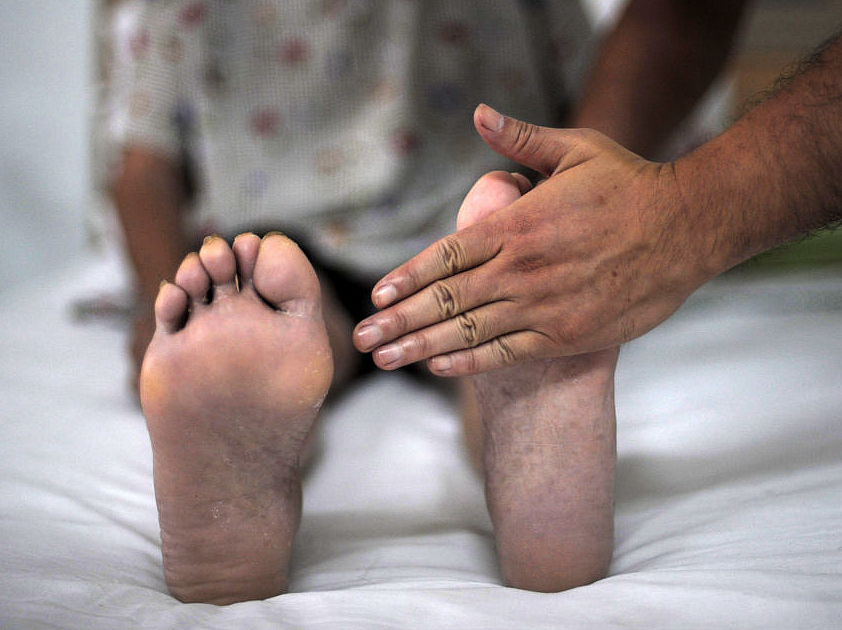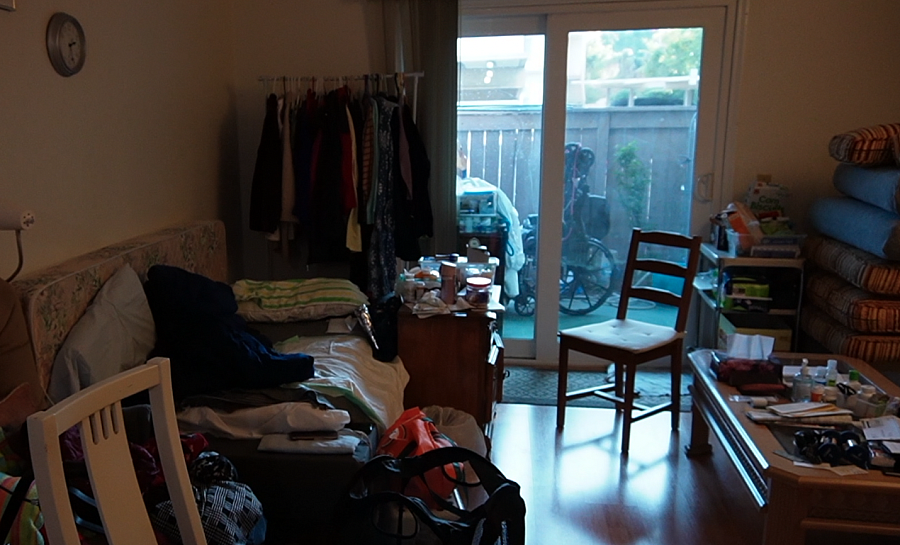Undocumented Chinese Immigrants Fill Caregiver Gap, Working Long Hours

Virginia Lee, in her 80s, is unable to move freely due to a stroke. Through a referral, Lee found an undocumented couple and rented her bedroom to them, moving herself to the living room. Although she was sleeping on the sofa instead of her bed, having people around to help with daily tasks eased her situation a lot.
Jian Zhao/World Journal
The Chinese community, like many others, has a growing elderly population while facing a critical shortage of caregivers. As the largest Asian ethnic group aged 65 years and older, Chinese Americans are projected to grow to 7.9 million by 2060, more than tripling from 2.5 million in 2019.
With more Chinese American adult children moving away from traditional expectations of caregiving, the need for care has increased. Chinese seniors often struggle to find caregivers who can speak the language and attend to their needs. As a result, undocumented Chinese workers are increasingly entering the workforce to address the shortage of caregivers for older Chinese adults.
Kris Xiaoju, 23, arrived in the U.S. last year, and found a job taking care of six different elders, ages 70 to 90.
Xiaoju works at a private elder care home in San Jose with a capacity of six beds. In addition to Xiaoju, there is one other employee, a woman in her 50s, and the owner of the business who also works at the facility, to take care of the needs of the residents there.
The seniors at the nursing home were all unable to care for themselves and mostly stayed in bed. “At first, I felt nauseous when I had to clean them,” Xiaoju said. “Some confused elders would even hit me. But I’m getting used to it now.”
Working here, Xiaoju not only takes care of the seniors but also handles the chores in the elder care home. “All the heavy lifting is mine—moving beds, helping elders get out of bed, unloading boxes … I was hired because I was young and strong.”
Every morning, Xiaoju is one of the first to wake up in this two-story single-family home. He sleeps on the couch in the living room.
His official start time is 8 a.m., and he begins by first getting the residents out of bed and helping with activities of daily living, like bathing, toileting, dressing, eating. Then there’s cleaning, doing laundry, administering medication, and taking those who can on walks. Xiaoju stays busy until 10 p.m., the official end of his shift. But at night, he gets up whenever the elderly need assistance.

Caregivers work long hours to meet the needs of seniors.
Photo by China Photos/Getty Images
Aside from work-related conversations, Xiaoju barely speaks to anyone. “I wake up at 7 a.m. and go to sleep around midnight; every day is the same.”
Xiaoju can take three days off each month, but without a car or a single friend, he still spends most of his time in the nursing home. " I'm too tired at work; whenever I have free time, I just want to rest, lie down, watch videos or listen to music," he said.
Being a caregiver is one of the most popular job options for undocumented Chinese immigrants. According to Leo Chen, manager of the Lianjiang Employment Agency in Monterey Park, the high demand for caregiving jobs, the easy-to-meet requirements, and the provision of food and accommodation are reasons why many undocumented immigrants with language barriers choose this work.
“However, the downside is that the specific working hours and job responsibilities are not clearly defined. As long as both parties agree, any kind of work arrangement is possible,” Chen said.
Caregiving for Rent
In the Hacienda Heights neighborhood of Los Angeles, a community with a large population of elderly Chinese, Virginia Lee, in her 80s, may have found a suitable solution.
Due to a stroke, Lee is unable to move freely. However, finding a caregiver is expensive, so to cover the costs, she sold her Toyota. Not long after, she ran out of money from the car sale, and considered selling her apartment.
Her friends stopped her, warning that she would end up with nothing.
Through a referral, Lee found an undocumented couple and rented her bedroom to them, moving herself to the living room. Although she was sleeping on the sofa instead of her bed, having people around to help with daily tasks eased her situation a lot

Lee’s living room
Jian Zhao/World Journal
“Even though the tenants pay very little rent, they can look after me and help me do groceries,” Lee said.
In 2021, Lee, who lived alone, received a scam phone call from someone claiming to be police in China. In just three months, her life savings were completely drained by the criminal group, leaving her to rely on her monthly pension of about $900. According to the bank transfer documents Lee provided to the Los Angeles County Sheriff's Department, in just two weeks between late June and early July 2021, she made five transfers to the fraudsters’ bank accounts in Singapore, totaling $1.2 million, leaving her retirement account with nothing remaining.
During the interview, Lee curled up on the sofa, unable to turn over, with numerous medicine bottles beside her. She had just been discharged from the hospital after her most recent stroke before the tenants moved in.
“At that time, I lay in the bathroom for two days, crawled to the living room and lay there for another day, and eventually a neighbor found me,” Lee said.
The Last Option
“If you are a legal worker, there are many more job options available. Very few people are willing to do caregiving work because it’s demanding but low paid,” Chen said.
Care workers are often paid a daily wage: caregivers for self-sufficient seniors earn about $100 a day, while those caring for seniors who are unable to care for themselves earn around $150 a day on average.
The definition of “a day” can vary widely. Chen added, “For seniors who cannot care for themselves, you have to do whatever is needed; it's common to be called in the middle of the night.”
“Whatever the boss asks, I do it,” Xiaoju said, referring to the owner of the elder care home. He described his attitude toward his boss as “completely obedient.” And has never discussed work hours. “I don’t dare to bring it up.”
“If I have a little free time at work, I would look for more work but I’m afraid of what the boss might say. Usually, he doesn’t address me directly, just says, ‘You need to work during working hours.’ However, if he thinks I’m slacking off, he might warn me, ‘If you don’t work well, you’ll be fired.’”
The pay can fall far below minimum wage. A 55-year-old undocumented immigrant, Yuan Yang, said that in his last job as a home caregiver, he was paid $600 a month for three years.He added, “Once you get older, no restaurant would hire you. Caregiving is the only work you can do.”
Exposed To Risks
As a care worker, it is common to get injuries and illness due to heavy workloads and long hours. While it is difficult to accurately know their workplace injuries, the U.S. Bureau of Labor Statistics indicates that Certified Nursing Assistants (CNAs) have among the highest rates of injuries and illnesses of all occupations. Direct care workers face risks of injury when helping clients move (such as getting in and out of bed or assisting with standing or walking), particularly if proper lifting techniques are not used. For undocumented care workers, training often relies on trial and error.
The report also highlights that direct care workers may encounter difficult or violent behaviors from clients with cognitive impairments or mental health issues, as well as hazards from infections and exposure to communicable diseases.
For undocumented care workers, if they have to see a doctor, their hard-earned money may quickly be depleted due to high medical costs, especially in California where the average cost of health care is the third highest in the nation.
Although California has expanded public Medi-Cal coverage to undocumented immigrants as of January 1, 2024, there are concerns about applying for the health insurance within the undocumented group.
“It will impact my immigration application,” Xiaoju said firmly. His attorney, whom he paid $10,000 already, informed him that Medi-Cal is considered a form of government welfare and could potentially affect his immigration case.
Such rumors are spreading within the community. “It’s better to believe it exists than to believe it doesn’t.” That’s a common perception among isolated undocumented individuals when discussing legal matters. Xiaoju, an asylum seeker, flew from his hometown in Hunan to Hong Kong, then traveled to Ecuador, then spent nearly two months making his way through South America before finally entering the United States. He does not want to take any risks with his immigration application.
Zenny Dong, health programs advocate at Asian Americans Advancing Justice Southern California (AJSOCAL)confirmed that the use of health, food, and housing benefits are not considered part of the public charge determination. Therefore, the use of Medi-Cal benefits does not count as a public charge and will not negatively impact an individual’s immigration status. However, if someone is receiving long-term care in a nursing home or other facility that is paid for by the government, this could be considered a public charge. This is general information and not legal advice. Individuals can contact AJSOCAL for assistance regarding immigration legal matters and healthcare access. They provide both Mandarin and Cantonese service.
Demand for Undocumented Immigrant Care Workers
According to the report, the key challenges to meeting the demand for caregivers is low wages and limited career advancement opportunities. Many other sectors facing workforce shortage can increase wages, but care services are often already too expensive for many California families who need them.
In the first quarter of 2023, median hourly wages ranged from a low of $15.60 for home health and personal care aides to a high of $20.10 for certified nurse assistants, both well below the statewide median of nearly $25. Those working under the table are not included in official labor market data.
Jessica Tran, manager of the social services department at the Chinatown Service Center, explains that one of the primary obstacles for Chinese Americans in finding caregivers is the language. Many elderly individuals speak only Mandarin, Cantonese, or other regional dialects. This narrows the pool of available caregivers. Cultural sensitivity is another challenge, as elders often prefer caregivers who understand their traditions, customs, and dietary preferences.
When care workers and clients do not share a common language, communication gaps can arise, leading to misunderstandings about care needs, preferences, and important instructions like medication management, Tran said. This lack of effective communication can impact the quality of care provided.
According to the research on the care-receiving experiences among older Chinese immigrants, the majority of interviewees preferred companionship and rapport. They valued matched gender, language, and ethnic food culture, etc.
“At the same time, on the supply side, care workers may struggle to access proper training and certification if educational materials are only available in the dominant language. These challenges make it difficult for families to find caregivers,” Tran added.
“In the absence of options, whether a care worker is undocumented or not becomes less of a concern," Cindy Chao, manager of a San Gabriel senior daycare center, says it is very difficult for Chinese elders to find long-term, stable care workers. She is often asked if she can help introduce home care workers, as the elderly often don’t know where to find them. ”Even for undocumented immigrants, many see this job as temporary work, resulting in very high turnover rates. In some senior living facilities, it’s common for residents to share a single care worker,” she said.

According to the California Health Care Foundation, direct care work is physically and emotionally demanding, yet wages for direct care workers remain low, and many direct care workers live in poverty. This contributes to high rates of burnout, turnover, and fewer people willing to perform these jobs.
“Normal people don’t want to do this kind of work, but it’s for survival,” Xiaoju said.. “Right now, all I think about is money; nothing else matters. Once I save enough, I will quit this job.”
This World Journal project is supported by the USC Annenberg Center for Health Journalism, and is part of “Healing California,” a yearlong reporting Ethnic Media Collaborative venture with print, online and broadcast outlets across California.

